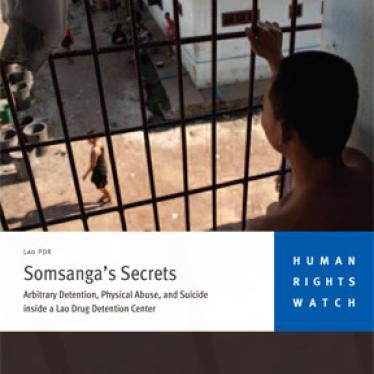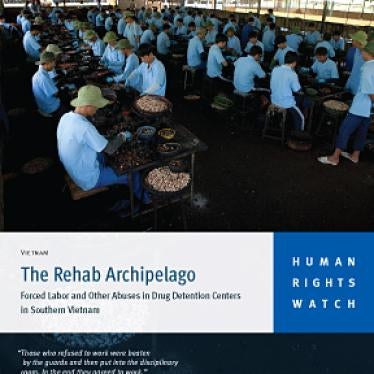Around the world, millions of people are locked up because of drug use. Some languish in prisons, some in compulsory drug detention centers. Few have access to effective, evidence-based treatment for drug dependency if they need it. The problem is not isolated in any one part of the world, but it is most pernicious when international donors and UN agencies promote and fund drug detention policies that systematically deny people the right to due process and healthcare, and ignore forced labor and psychological and physical abuse.
The relationship of the US government and Laos is an example.
Earlier in June, with much fanfare, the U.S. Government pledged a new round of funding and collaboration in Lao People's Democratic Republic. The U.S. committed $400,000 to support the Lao National Commission for Drug Control and Supervision to "upgrade the treatment of drug addicts at the Somsanga Treatment Center and at other centers."
The name Somsanga should ring alarm bells. Human Rights Watch conducted research in Laos in 2011 as part of a series of investigations of drug detention centers. It was not easy. Laos is largely a closed country, which permits little free speech or scrutiny of its human rights record.
What the government and its donors describe as a voluntary "health-oriented" center arbitrarily detains people who use drugs - including those who are not dependent - as well as street children, the homeless, the mentally ill, and other undesirable populations behind high walls and barbed wire.
Somsanga holds most people against their will. They are detained by police or local militia, or "volunteered" by local communist commune authorities or family members who have the mistaken belief that the center offers therapeutic treatment, or who buckle under social pressure to make their village "drug free." Once inside, they cannot leave. Some attempt or commit suicide by ingesting glass, swallowing soap, or hanging. As Maesa, a child who spent six months in Somsanga, told Human Rights Watch: "Some people think that to die is better than staying there."
Upgrading drug treatment and tackling crime are worthy goals. But the U.S. should not so blithely ignore the Laos government's history of human rights violations at the Somsanga Center. It needs to insist on development of stronger legal protections to ensure that people cannot be subject to arbitrary detention and torture, and on community and evidence-based drug dependency treatment.
Detention in government centers in the name of treatment and rehabilitation is not unique to Laos. As Human Rights Watch and other research has shown, hundreds of thousands people identified as drug users are held in drug detention centers in China, Vietnam and Cambodia too.
Nor are such centers and what goes on inside their locked doors and high walls the only human rights abuses associated with drug enforcement funding. Thirty-two countries worldwide retain the death penalty for drug offenses. China, Iran and Vietnam are among those that utilize the death penalty the most, and they all get drug enforcement assistance from international donors and the United Nations.
Governments and drug control agencies regularly announce successes in fighting the drug trade, counted in kilos of drugs seized and numbers of people prosecuted. But we rarely hear about the fate of those arrested, including how they came to be involved in the drug trade. Those sentenced to death become a statistic in drug enforcement "successes," while passing simultaneously into human rights statistics documenting ongoing abuse.
It is a clear example of the wide gap between drug control and respect for human rights.
In recent years, due to the efforts of Harm Reduction International, Human Rights Watch and our colleagues and partners, there have been increasing calls to close all drug detention centers and end the death penalty for drugs.
But there has been little practical progress toward ending these abuses. UN agencies and international donors continue to fund activities inside drug detention centers, and to support drug enforcement efforts despite the human rights consequences.
Scant attention has been paid to the UN and international donors' human rights obligations and ethical responsibilities with respect to drug control efforts they support, or indeed to safeguards to prevent them from effectively facilitating human rights abuses with their support.
A new report called "Partners in Crime" makes an important contribution to addressing this gap. In providing specific examples of financial and material support provided by UN and international donors for drug control efforts, and human rights concerns raised by such support, the report compels readers to think critically about government efforts to meet their shared responsibility to address drug use and drug-related crime. It should serve as a catalyst to ensure that all governments - including donors - and international actors move quickly to develop and support drug control policies that truly respect, protect, and fulfill human rights.
Rebecca Schleifer is advocacy director of the Health and Human Rights Division at Human Rights Watch.








